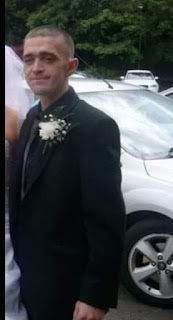 |
| Paul Rea |
I had on occasion met him and passed pleasantries either on the Lower Ormeau Road and in his parents' home when I would sometimes drop by and he happened to be there.
I knew both parents from childhood, his father Frankie being one of my closest friends. I recall him and Eleanor starting to go out together. We shared many experiences growing up in a community pilloried by hatred and plagued by violence, both emanating from the homicidal world of loyalism. There was also the presence of the IRA, not known for its peaceful means. Yet we had great memories, handball, discos and cider drinking figuring amongst them. He painted while I tiled. It paid for the Strongbow.
Still, there was an element of grief that weaved its way into my friendship with Frankie. I attended the funeral of his nephew Paul, killed by a car on the Lower Ormeau at the age of seven. I can still recall the wail of grief that went up as Paul's coffin made its way along McClure Street. That was just over half a century ago, yet Frankie and I go back even further than that: to the end of the 1960s.
As I write on New Year's Day, my memory is prompted by my mother vising me in Magilligan Prison and telling me that Frankie and some of my other mates had called to our home on the front of the Lower Ormeau Road just after midnight on the first day of 1975 with a bell to ring in the New Year. It was touching but made me homesick, being so distant from the festivities. But at seventeen I was arrogantly comfortable belonging to my other family - the IRA. I got on with doing my time.
A year later, when I went back inside to do a lot more of it Frankie visited me in the H Blocks. Not quite the setting we had envisaged when knocking about the Lower Ormeau listening to Slade, wearing crombies and skinners, while brandishing umbrellas. I had made the journey from being a teenage rioter to something quite different. The RUC told me at eighteen that I was a fully fledged terrorist, although I thought it was a description that fitted them better.
On my first day out of prison on a short parole in August 1989 apart from Frankie, one of those I dropped in on was his mother, Dolores. When she died some years ago, I penned a few words in her memory.
We expect our parents to die in our lifetime. The grief caused to us by the death of a parent is the price we pay to spare them an immeasurably greater grief were we to die before them. Yet whatever comfort me might derive from acting as pallbearer to that burden simply does not come into play when we lose our children. When the order of things is reversed, there are no words that can act as a balm. Grief just erupts in all its devasting potency.
When Paul, their eldest son, died in June I immediately got in touch with both Frankie and Eleanor. But it was near impossible to say anything of meaning or with sufficient weightiness to penetrate the depths of inconsolable grief they must have been going through. Words just sound hollow, weightless in the sombre setting of heavy bereavement where the centre of gravity is a crushing despair.
Paul is the second child they have lost as parents. A younger brother died in infancy. Eleanor still retains the letter I wrote to them from prison on that terrible occasion. She reminded me of it just after Paul's death.
When they married in 1977 I sent out a gift crafted in Long Kesh. To contemplate that in the time that has elapsed they have outlived two of their children is a shuddering thought. Earlier in the week I was reminded that there is no coffin heavier than that of a child. The weight that lends itself to the coffins of two children is incomprehensible.
When Paul, their eldest son, died in June I immediately got in touch with both Frankie and Eleanor. But it was near impossible to say anything of meaning or with sufficient weightiness to penetrate the depths of inconsolable grief they must have been going through. Words just sound hollow, weightless in the sombre setting of heavy bereavement where the centre of gravity is a crushing despair.
Paul is the second child they have lost as parents. A younger brother died in infancy. Eleanor still retains the letter I wrote to them from prison on that terrible occasion. She reminded me of it just after Paul's death.
When they married in 1977 I sent out a gift crafted in Long Kesh. To contemplate that in the time that has elapsed they have outlived two of their children is a shuddering thought. Earlier in the week I was reminded that there is no coffin heavier than that of a child. The weight that lends itself to the coffins of two children is incomprehensible.
How does eighteen years in jail compare to losing two children? It doesn't. Most parents would gladly serve a life sentence if it could preserve the lives of their children. Unfortunately, the option is not available. There is no rewind button, nor a fast forward to take parents out of grief.
My friends' son is at peace now but they carry on in the sure knowledge pithily expressed by Ernst Jünger - “His death brings a new experience to my life — that of a wound that will not heal.”
My friends' son is at peace now but they carry on in the sure knowledge pithily expressed by Ernst Jünger - “His death brings a new experience to my life — that of a wound that will not heal.”
⏩ Follow on Twitter @AnthonyMcIntyre.






No comments